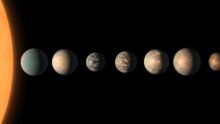
The likelihood that humans will colonize another planet in the near future is real. NASA, Elon Musk’s company, Space X, and some countries, such as China, are working on plans to colonize either the moon or Mars. Musk is the most ambitious, claiming that we will establish a colony on Mars within five to ten years, and he is already working on building the spaceships and training potential colonists to live there.
For those interested in the colonization of space, the burning questions have been when and how such a thing can be accomplished. An equally important question is why should we colonize in space, and does the prospect of doing so bring up any ethical questions? I think it does.
There are two broad reasons for establishing colonies on other planets. The first of these is survival, what Musk calls “defensive” reasons. Humans have the power to wipe themselves out on this planet. We could either do it quickly through nuclear war, or slowly through climate change. Some thinkers, such a Musk and Stephen Hawking, believe one or the other of these events is almost inevitable and in the near future. The second set of reasons for colonizing other planets is to extend ourselves beyond the boundary of our own small biosphere. Both survival and extension of humanity are based on ideas about the value of mankind. A third factor, which ought to impinge upon a decision about whether we should colonize beyond our own planet is whether life already exists on other planets. I want to look at all three of these issues.
It’s certainly possible that earth will undergo an “extinction event” in the foreseeable future. The threat of a global nuclear war has increased recently, due to threats from Vladimir Putin and Kim Jong Un to use their nuclear weapons as a way to settle regional disputes. We now have nine nations who have operational nuclear weapons. Ninety percent of such weapons are possessed by either Russia or the U.S., and both countries have been reducing their stockpiles, but, as Stockholm International Peace Research Institute Director Dan Smith said, just this year, “While the global total of nuclear warheads continues to fall as cold war-era weapons are gradually dismantled, regrettably we continue to see year-on-year increases in the number of operational nuclear warheads.”

Despite claims to the contrary, the evidence of global warming, spurred by the production of greenhouse gases and the reduction in CO2 absorbing and oxygen producing forests, is incontrovertible. It will soon be past the point of reversibility. While all life on the planet would not be wiped out by such warming, much of it would, and the livable habitat for humans will be severely restricted.
Some, particularly science fiction authors, but also others such as scientists and theologians, have less desperate reasons for wanting to expand humanity beyond our own planet. Elon Musk talks about the “excitement” of such an endeavor; in the words of Captain James T. Kirk on Star Trek, ” to explore strange new worlds; to seek out new life and new civilizations; to boldly go where no man has gone before!” Others cite the need to seek resources beyond the limits of our own planet. Those with a religious or spiritual bent talk about “the duty to extend life” into the wider universe. This is similar to the ideas that shaped European colonization of Asia, Africa and the New World, such as the 15th century Papal decree referred to as the “Doctrine of Discovery.” Even the colonies themselves, when they became independent, subscribed to the idea of a “Manifest Destiny” that propelled them to take possession of the entire North American continent.
Finally, scientific curiosity prompts many to want to put humans on distant planets. There is only so much that can be learned from long distance, and questions about the conditions necessary for life, the effects of planetary events on the survival of organisms, and even the eventual fate of planetary environments can only be answered by close-up scientific scrutiny.
So, there are lots of reasons for colonizing other planets. But is it the right thing to do?

As science fiction writer Kim Stanley Robinson has pointed out, trying to solve the problem of a human-caused extinction event by finding a planet B where we can reestablish ourselves, is the hard way to ensure our survival. As far as we know, the surface of every other planet or moon in our solar system is hostile, if not to all life, then to our kind of life. Besides the immensity of the task getting to other planets, the idea of transforming one or more of them into an environment hospitable to humans is daunting. Imaginative scenes from TV, films and video games make such colonies look possible, even inviting, but the reality is that not only would another planet not have what we need to survive, it might include things that will kill us. Furthermore, the cost in money, effort, and labor to establish and then sustain such a colony would be larger than anything attempted by man in the past, and it would take decades before such a colony could become self-sustaining. All of this effort is more than it would take to fix our problems here on earth, and if we set our goal on leaving, we’re liable to stop trying to fix our problems at home. Finally, even if a colony could be established, the number of people it would contain would be miniscule compared to our earth population. Saving humanity by saving an infinitesimally small portion of us while the vast majority endure a horrible extinction would be a very limited victory and not one that most of us would be able to take advantage of.
So much for the practical aspects of colonization as a way to avoid extinction. There are other reasons besides survival that could make such a project desirable. However, most of them rest on the assumptions that either we are the only living organisms in the universe, or at least we are the most important. Surely, some planets, Mars most likely, that were once livable and may have supported life, no longer are and are barren. Others may not support life now but have the potential to do so. Imagine another species coming to earth almost four billion years and deciding that we were free for the taking because we were barren of life. Or three and a half billion years ago when the only life were tiny microbes, which the alien species either didn’t detect or dismissed as too primitive to ever evolve into anything of importance. In either case, we might not have come into existence if they decided to colonize our planet and make it life-supportable for their species.

When Europeans discovered and began to explore the New World, they brought diseases to which they were at least partially immune, but which wiped out huge amounts of the native population, in some places more than 90% of them. Merely stepping onto a planet on which we don’t know who lives there and what they are like, could extinguish an entire native species.
But it’s not just occupied planets that could present a problem for earth colonists. We are starting the colonization enterprise before we have learned to live together peacefully or to quit harming our own planet. The dangers and rigors of establishing a foothold on another planet suggest that it’s highly unlikely that the first colonists will live in a democratic society. Democracies are not the best type of organization to make serious life or death decisions rapidly, especially if daily life on the new planet is a defensive one, warding off dangers. Some kind of hierarchical, military-type government will probably be in charge. That it will eventually evolve into a democracy with freedom and individual rights for everyone, is chancy. Add to this the fact that at the present time, either private industry, looking for a way to make a profit, or nations, looking for an advantage over other nations, will probably be the ones who establish the first colonies, and the likelihood of bringing with them the very problems that leaving earth was supposed to solve is substantial.
So, should we stay at home? As a curious, adventurous individual who is also a science fiction writer, of course I say no. We should go into space, and we should explore what is out there. Some of that exploration may include establishing colonies, if only to have bases in space that support even more exploration. But colonies on another planet are not going to solve our problems here on earth, and unless we solve our problems here, most of us, or our descendants, will be stuck with those problems and they may kill us. Saving a few is not the answer.
So, let’s continue to look to space, dream big, and invest in ways to explore beyond our own planet. As Elon Musk says, it is exciting, and it’s interesting. I’m not sure there is any ultimate, spiritual reason for ensuring the survival of our species, but I’d like people like me to be able to see what’s out there. And if there is anyone else out there, I think it would be great if we could meet them and expand human knowledge and awareness even further.
By the way, my novels, Ezekiel’s Brain and Prime Directive deal with some of these issues. They’re both available on Amazon as part of the Voyages of the Delphi series. See below. My newest novel, which is still in the works, addresses some of these issues specifically as the android crew of the Delphi discovers a generation ship from another civilization inside a giant asteroid. The only problem is that the alien ship kills humans, including those who inhabited it. Finding Gaia will be published sometime in 2025.
To buy Ezekiel’s Brain or Prime Directive, Click Here
Subscribe to Casey Dorman’s Newsletter. Click HERE






A very well written and interesting text, the content of which I completely agree with. Colonies on other planets should be for exploration, certainly not to save “humanity”.
Large space stations or structures such as Bishop’s Ring seem to me to be more effective for living permanently off Earth. You can adjust the climate and gravity there, as well as all the other parameters needed to sustain life.
I disagree with most of the assertions and assumptions. Humanity should devote its efforts to colonizing outer space via orbital habitats and vivariums (See: Dr Gerard K. O’Neill’s High Frontier). The ability to construct habitat volume is far more feasible that finding habitable planets – or terraforming them.
https://web.archive.org/web/20180503042505/https://settlement.arc.nasa.gov/Basics/wwwwh.html#why
“The key advantage of space settlements is the ability to build new land, rather than take it from someone else. This allows a huge expansion of humanity without war or destruction of Earth’s biosphere. The asteroids alone provide enough material to make new orbital land hundreds of times greater than the surface of the Earth, divided into millions of colonies. This land can easily support trillions of people.”
. . . a conservative estimate.
We can built billions of colonies and support quadrillions of people.